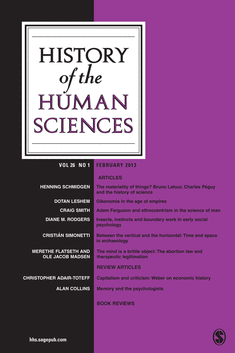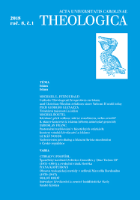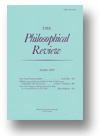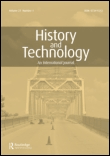
HISTORY OF THE HUMAN SCIENCES
Scope & Guideline
Unraveling the Tapestry of History and Philosophy
Introduction
Aims and Scopes
- Interdisciplinary Historical Analysis:
The journal promotes a multidisciplinary approach to understanding the human sciences, examining historical developments in psychology, sociology, and anthropology, and how they have shaped contemporary thought. - Critical Examination of Human Behavior:
Research published in this journal often critiques and analyzes human behavior through various lenses, including film and media studies, which reflect the cultural and societal implications of psychological and anthropological theories. - Exploration of Colonial and Postcolonial Contexts:
There is a consistent focus on colonial and postcolonial studies, investigating how these contexts influence the understanding and development of human sciences and the socio-political implications of these disciplines. - Genealogical Investigations:
The journal frequently employs genealogical methods to trace the origins and transformations of key concepts within the human sciences, such as sexuality, race, and identity, providing a deeper understanding of their historical significance. - Social and Cultural Critique:
A significant aim of the journal is to critique social norms and practices related to the human sciences, including discussions on ethics, power dynamics, and the impact of scientific knowledge on societal structures.
Trending and Emerging
- Visual Culture and Media Studies:
Recent publications increasingly explore the intersection of visual culture and the human sciences, analyzing how film, photography, and other media shape our understanding of psychological and social phenomena. - Critical Race and Gender Studies:
There is a growing emphasis on critical race theory and gender studies, with papers examining the historical and contemporary implications of race and gender in the development of human sciences. - Health and Illness Narratives:
Emerging themes focus on the narratives surrounding health and illness, particularly in the context of the COVID-19 pandemic, highlighting how social sciences respond to contemporary crises. - Ethnographic Methods:
The use of ethnographic methods in historical research is gaining traction, as scholars seek to understand the lived experiences of individuals within the frameworks of human sciences. - Interdisciplinary Approaches to Knowledge Production:
There is an increasing trend towards examining how knowledge is produced across disciplines, particularly in the context of social sciences, ethics, and the implications of scientific research in societal contexts.
Declining or Waning
- Traditional Psychological Theories:
There is a noticeable reduction in papers focusing exclusively on traditional psychological theories and methodologies, as the journal increasingly embraces more interdisciplinary and critical approaches. - Classical Anthropology:
Themes centered on classical anthropological methods, such as armchair anthropology, appear to be less frequent, indicating a shift towards more contemporary and applied anthropological perspectives. - Historical Narratives of Progress:
The journal has moved away from linear historical narratives that portray the progress of human sciences in a straightforward manner, preferring instead to engage with complexities and contradictions in the historical development of these fields. - Static Views on Identity:
Discussions that present static or essentialist views on identity, particularly regarding race and gender, are becoming less common, as the journal increasingly prioritizes fluid and intersectional understandings. - Overly Theoretical Frameworks:
There has been a decline in the publication of papers that rely heavily on abstract theoretical frameworks without empirical grounding, reflecting a preference for more applied and contextually situated research.
Similar Journals

Investigaciones Fenomenologicas
Exploring the Essence of Human ExperienceInvestigaciones Fenomenologicas is a pioneering journal in the field of phenomenological research, dedicated to exploring the depths of human experience and consciousness. Published by the UNIV NACL EDUCACION & DISTANCIA-UNED in Madrid, Spain, this journal serves as a vital platform for scholars and practitioners who strive to deepen their understanding of phenomenology and its applications in various disciplines, including psychology, education, and the social sciences. With a commitment to fostering intellectual dialogue, Investigaciones Fenomenologicas invites contributions that challenge conventional paradigms and enrich the academic landscape through empirical studies, theoretical discussions, and critical analyses. While currently not open access, the journal’s exclusive focus on phenomenology makes it an essential resource for researchers and students aiming to stay abreast of the latest developments and methodologies in this evolving field. ISSN: 1885-1088.

INTERNATIONAL JOURNAL OF AFRICAN HISTORICAL STUDIES
Illuminating the Past, Shaping the Future of African StudiesInternational Journal of African Historical Studies is a leading academic journal published by the African Studies Center at Boston University. With its ISSN 0361-7882 and E-ISSN 2326-3016, this journal serves as a vital platform for scholarly discourse in the fields of History, Cultural Studies, and Sociology. Renowned for its rigorous peer-reviewed research, the journal holds a commendable Q1 ranking in History and Q2 in Cultural Studies as of 2023, highlighting its influence and contribution to African historical scholarship. The journal has been published since 1976, consistently providing insightful analyses and critical research that engage with Africa's past and present, thereby enriching our understanding of global histories. Although it does not offer an open-access model, the journal is accessible through various academic databases and institutions. Its mission is to foster a deeper understanding of African histories by publishing high-quality, innovative research that reflects diverse perspectives, making it an essential resource for researchers, professionals, and students dedicated to the study of African history and cultural dynamics.

Emotions-History Culture Society
Advancing Scholarship on Emotions in Historical ContextsEmotions-History Culture Society is a distinguished journal published by BRILL, dedicated to exploring the intricate intersections of emotion, history, and cultural studies. With an ISSN of 2206-7485 and an E-ISSN of 2208-522X, this journal contributes to the advancement of knowledge through its rigorous scholarship and interdisciplinary approach. Operating from the Netherlands, it is positioned as an essential resource for researchers and academics in the fields of history and cultural studies, ranked in the Q3 category for both areas as of 2023. With diverse articles that resonate within the social sciences, the journal addresses contemporary challenges and historical contexts emphasizing the role of emotions in society. As a notable contributor to the academic landscape, it offers valuable insights, supporting open dialogue and intellectual development among scholars and students alike. Although currently published without Open Access, its high impact evidenced by its positioning in the 76th percentile for Arts and Humanities History underscores its relevance and importance in fostering a deeper understanding of emotional narratives within historical and cultural frameworks.

Spontaneous Generations-Journal for the History and Philosophy of Science
Bridging Historical Contexts with Philosophical InsightsSpontaneous Generations: Journal for the History and Philosophy of Science is a dedicated publication focusing on the rich fields of history and philosophy within the scientific domain. Published by the Institute for the History and Philosophy of Science and Technology, this journal provides a vital platform for scholars, researchers, and students to explore and disseminate ideas that bridge the historical context and philosophical inquiries of scientific practices. With its commitment to open access, Spontaneous Generations ensures that groundbreaking research is widely available, fostering an environment of collaboration and knowledge sharing. Aiming to engage a diverse audience, this journal is pivotal for those looking to understand the evolution of scientific thought and its implications on contemporary issues, making it an essential resource in the academic community.

Acta Universitatis Carolinae Theologica
Navigating Contemporary Theological LandscapesActa Universitatis Carolinae Theologica, published by CHARLES UNIV PRAGUE, KAROLINUM PRESS, is a distinguished academic journal that serves as a vital resource in the field of Religious Studies. With an ISSN of 1804-5588 and E-ISSN of 2336-3398, this Open Access journal has embraced a commitment to disseminating scholarly work freely since 2011, catering to a global audience from its base in the Czech Republic. The journal has been acknowledged in the 2023 category quartile ranking of Q3 in Religious Studies, reflecting its contribution to advancing theological scholarship and research. Operating within a converged time frame from 2019 to 2023, it features articles that encompass a diverse range of topics and methodologies, making it essential for researchers, professionals, and students alike who seek to engage with contemporary theological dialogues. Although it currently holds an H-index and Scopus rank that denotes a developing reputation, Acta Universitatis Carolinae Theologica continues to foster critical discussions and enhance the visibility of religious studies research in the academic community.

PHILOSOPHICAL REVIEW
Advancing Philosophical DiscoursePHILOSOPHICAL REVIEW, published by DUKE UNIVERSITY PRESS, is a leading academic journal in the field of philosophy, recognized for its rigorous scholarship and impactful contributions to theoretical and applied philosophy. With an impressive Q1 ranking in the 2023 Scopus metrics, it places within the top percentile of philosophical journals, affirming its significance in the discourse. The journal, which has a rich publication history since its inception in 1970, focuses on a diverse range of philosophical topics, catering to a broad audience of researchers, practitioners, and scholars. Although it doesn't offer Open Access options, its articles remain highly sought after for their depth and quality. With a dedicated readership and a commitment to exploring fundamental philosophical questions, PHILOSOPHICAL REVIEW continues to shape contemporary philosophical thought and engage with pressing issues in various domains.

HISTORY AND PHILOSOPHY OF THE LIFE SCIENCES
Unraveling the Threads of Life Sciences Through Time and ThoughtHISTORY AND PHILOSOPHY OF THE LIFE SCIENCES, published by SPRINGER INT PUBL AG, stands as a leading peer-reviewed journal dedicated to exploring the intricate relationships between historical narratives and philosophical frameworks in the life sciences. With its robust impact factor and recognized position as a Q1 journal in key categories such as Arts and Humanities, History, and History and Philosophy of Science, this journal provides a vital platform for researchers, professionals, and students seeking to delve into the theoretical underpinnings and historical trajectories shaping contemporary life sciences. Established in 1979 and evolving through its converged years until 2024, it reflects the journal's enduring commitment to advancing scholarly discourse in its field. While the journal is not open access, it nonetheless attracts a diverse readership, facilitating meaningful research exchanges and interdisciplinary dialogues. Located in the picturesque country of Switzerland, the journal invites contributions that foster critical examination and innovative thinking in the historiography and philosophy of life sciences, ultimately enhancing our understanding of this dynamic and significant discipline.

History and Technology
Investigating the Dynamic Dance of History and InnovationHistory and Technology is a leading academic journal that investigates the intricate relationship between historical developments and technological advancements. Published by Routledge Journals, Taylor & Francis Ltd, this esteemed journal has carved out a significant niche within the field of History and Philosophy of Science, reflecting its impressive Scopus rank of 48 out of 223 and a reputable 78th percentile ranking. The journal has been facilitating scholarly discourse since its inception in 1983, with a comprehensive coverage through its converged years extending from 1983 to 1988 and from 1990 to 2024. Although it operates on a traditional access model, its impact in the field is underscored by its current positioning in Category Quartiles as Q3 in the relevant subject area. Researchers, professionals, and students alike will find History and Technology to be an invaluable resource for deepening their understanding of how historical contexts shape technological innovations and vice versa.

Open Library of Humanities
Fostering Interdisciplinary Dialogue for a Richer UnderstandingThe Open Library of Humanities, a premier platform established in 2015 and based in the United Kingdom, elevates the discourse in the fields of Anthropology, Arts and Humanities, Cultural Studies, and Sociology and Political Science. Published by OPEN LIBRARY OF HUMANITIES, this open access journal provides a prominently accessible space for scholars and researchers to disseminate their findings and contribute to a diverse range of academic conversations. With an impressive Scopus ranking that reflects its influence—ranking in the 87th percentile in General Arts and Humanities and in the 80th percentile for Cultural Studies—the journal is recognized for publishing high-quality research that addresses significant and contemporary issues within its scope. By embracing a multidisciplinary approach, the Open Library of Humanities fosters interdisciplinary dialogue and encourages innovative research dissemination practices. Scholars, students, and practitioners are invited to engage with the latest developments and theoretical insights that enrich our understanding of the human experience.

Revue de Synthese
Connecting Tradition with Modern ThoughtRevue de Synthèse, published by BRILL, is a distinguished journal in the field of Philosophy, recognized for its rich academic tradition since its inception in 1950. With an impressive history of converged years and a steady commitment to philosophical discourse, the journal offers a platform for scholars to present innovative ideas and critical analyses. Although currently listed in Q4 of the 2023 category quartiles, it serves as an essential resource for those pursuing interdisciplinary studies, enriching the philosophical landscape amidst global intellectual challenges. The journal is not currently available as Open Access, making its curated content accessible through institutional subscriptions. With an ISSN of 0035-1776 and E-ISSN of 1955-2343, Revue de Synthèse aims to empower researchers, professionals, and students alike with transformative insights that advance the understanding of contemporary philosophical issues.